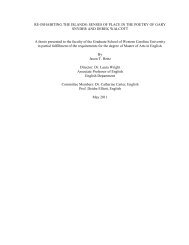SUMMERS, KAREN CRADY, Ph.D. Reading Incest - The University ...
SUMMERS, KAREN CRADY, Ph.D. Reading Incest - The University ...
SUMMERS, KAREN CRADY, Ph.D. Reading Incest - The University ...
You also want an ePaper? Increase the reach of your titles
YUMPU automatically turns print PDFs into web optimized ePapers that Google loves.
105<br />
One of the prevalent themes in Confessio Amantis, which appears in A King, and<br />
No King, is the need for proper, moderated governance, both of the self and of the nation.<br />
Amans repeatedly hears lessons on what happens when a man acts unreasonably and by<br />
analogy when a king governs selfishly, as when he gives in to incestuous desires. It is<br />
true that in both A King, and No King and <strong>The</strong> Duchess of Malfi the actual incestuous act<br />
is averted. In the former, Arbaces had become overwhelmed by his passion, to the point<br />
of committing the sin knowing full well that the object of his lust was his sister. <strong>The</strong> plot<br />
allowed the last-minute save and restored him to his better reason. In the latter Ferdinand<br />
was also “saved” from sexual intercourse with the Duchess but through his will she died<br />
(“to die” being a well-known euphemism for sexual climax). He may not have engaged<br />
in intercourse with her but he possessed her body in the only way that his warped psyche<br />
could allow and following this, his inhuman, bestial nature emerged.<br />
<strong>The</strong> Duchess of Malfi gains its dramatic strength from the horrific treatment of the<br />
title lady by her brothers. As fear of women’s power rose, so did the methods used to<br />
control them become more forceful. Though misogyny in literary works is ever present,<br />
Eileen Allman argues that Jacobean revenge tragedy is a vehicle for misogyny because<br />
men need to control women in order to exert dominance over other men. In a revenge<br />
tragedy, control over women and the resulting ill treatment of them is<br />
the flower of male rivalry. When a man is defeated by another man, he is both<br />
unmanned and feminized; that is, he is stripped of cultural signs of dominance and<br />
forced to assume those of submission. . . . For the loser, then, femaleness is not a<br />
separate and distinct sex but a denial of maleness. . . that can easily be displaced<br />
onto women in the form of misogyny. . . . Degendering authority means<br />
deauthorizing maleness, severing the automatic connection between dominance<br />
and maleness not only in the tyrant but also in the subject. (19-20)
















